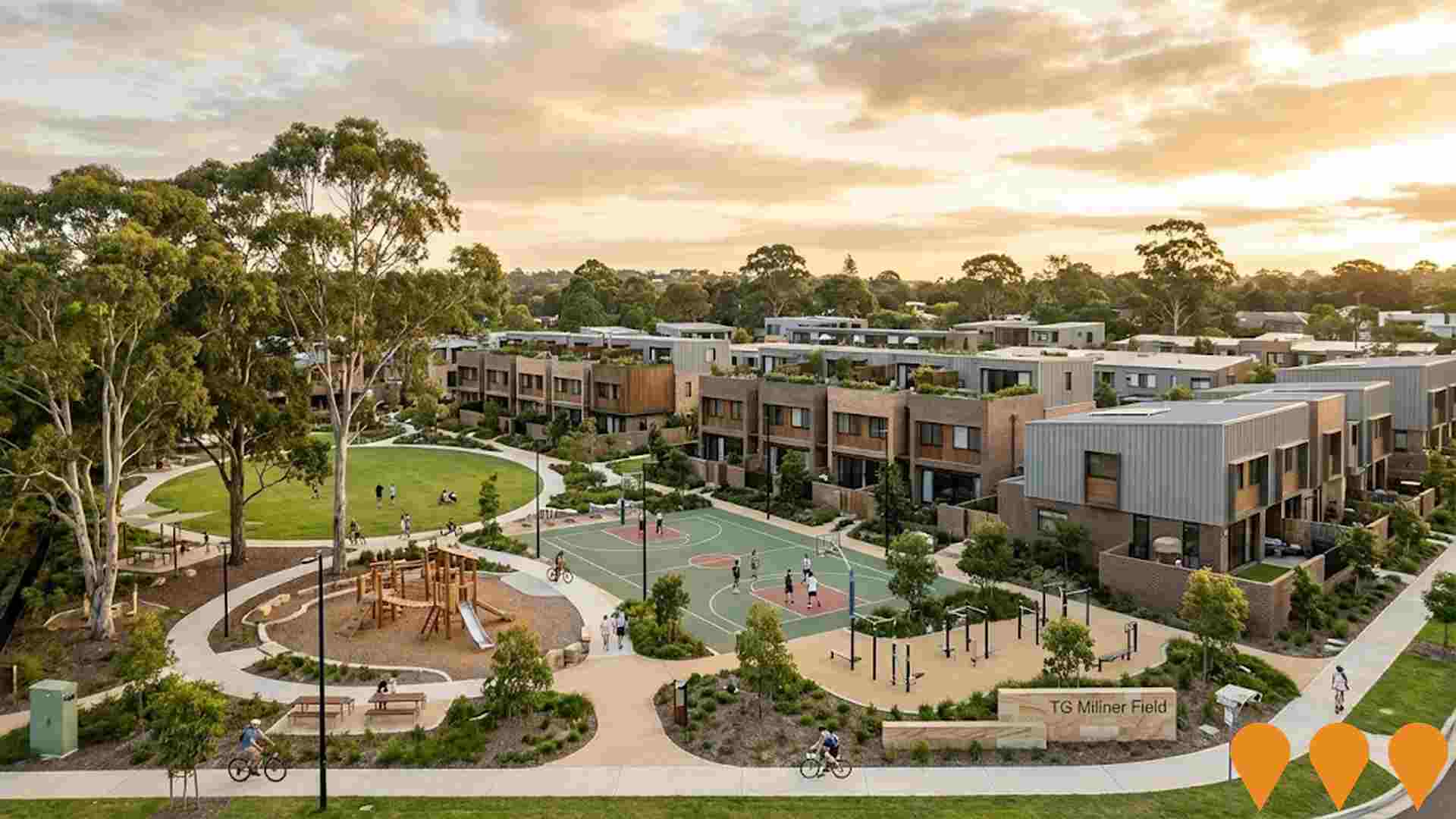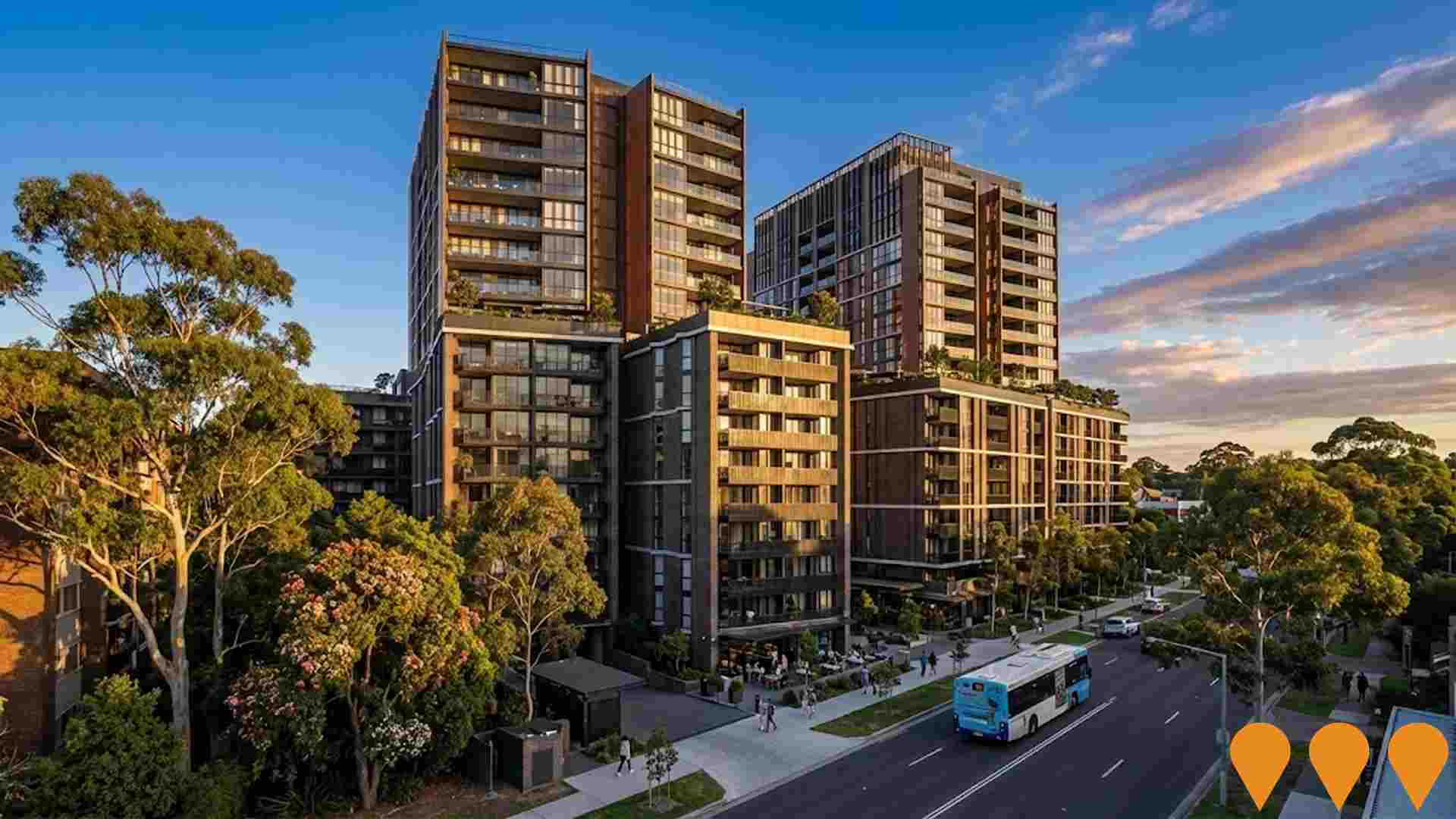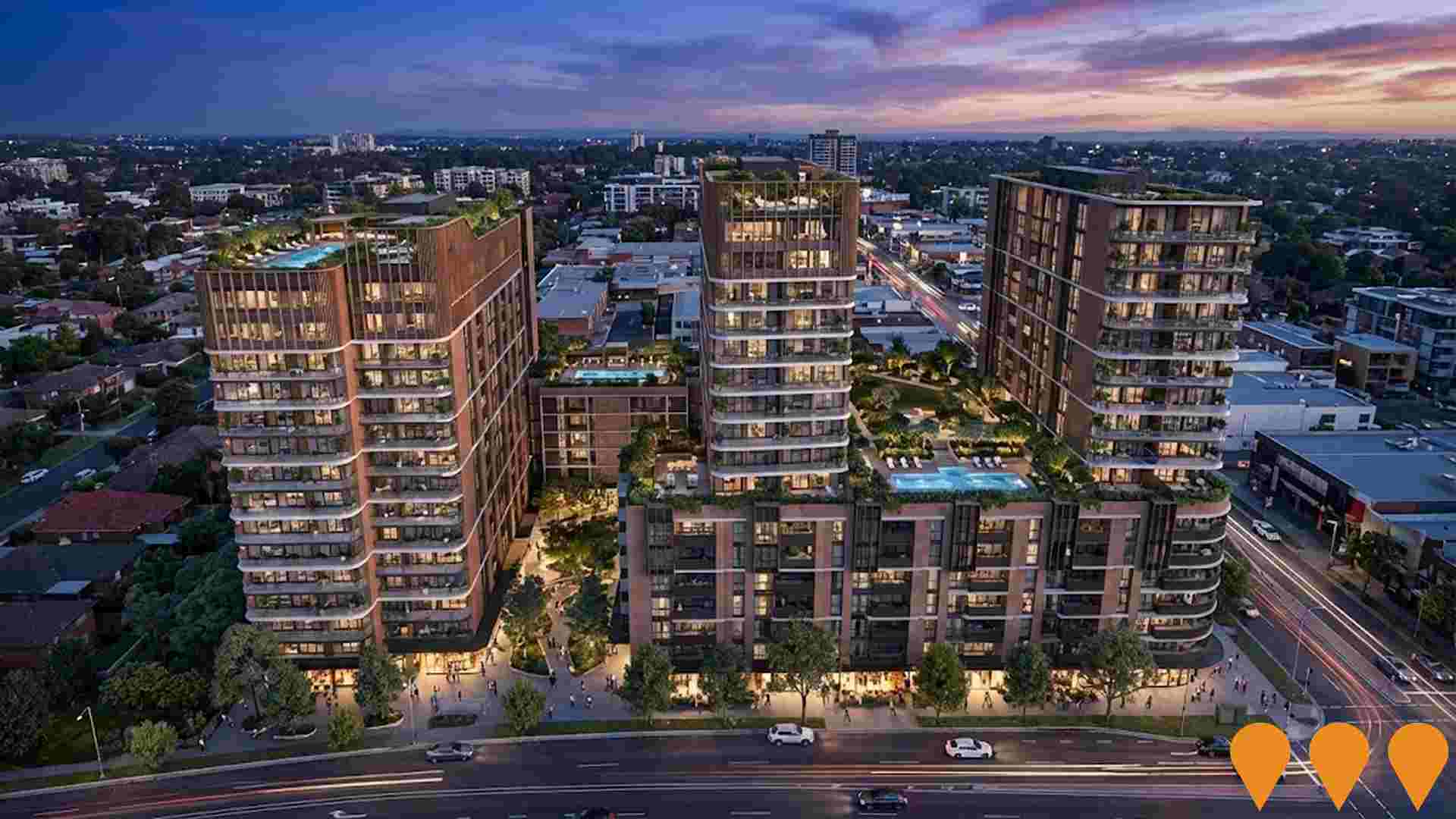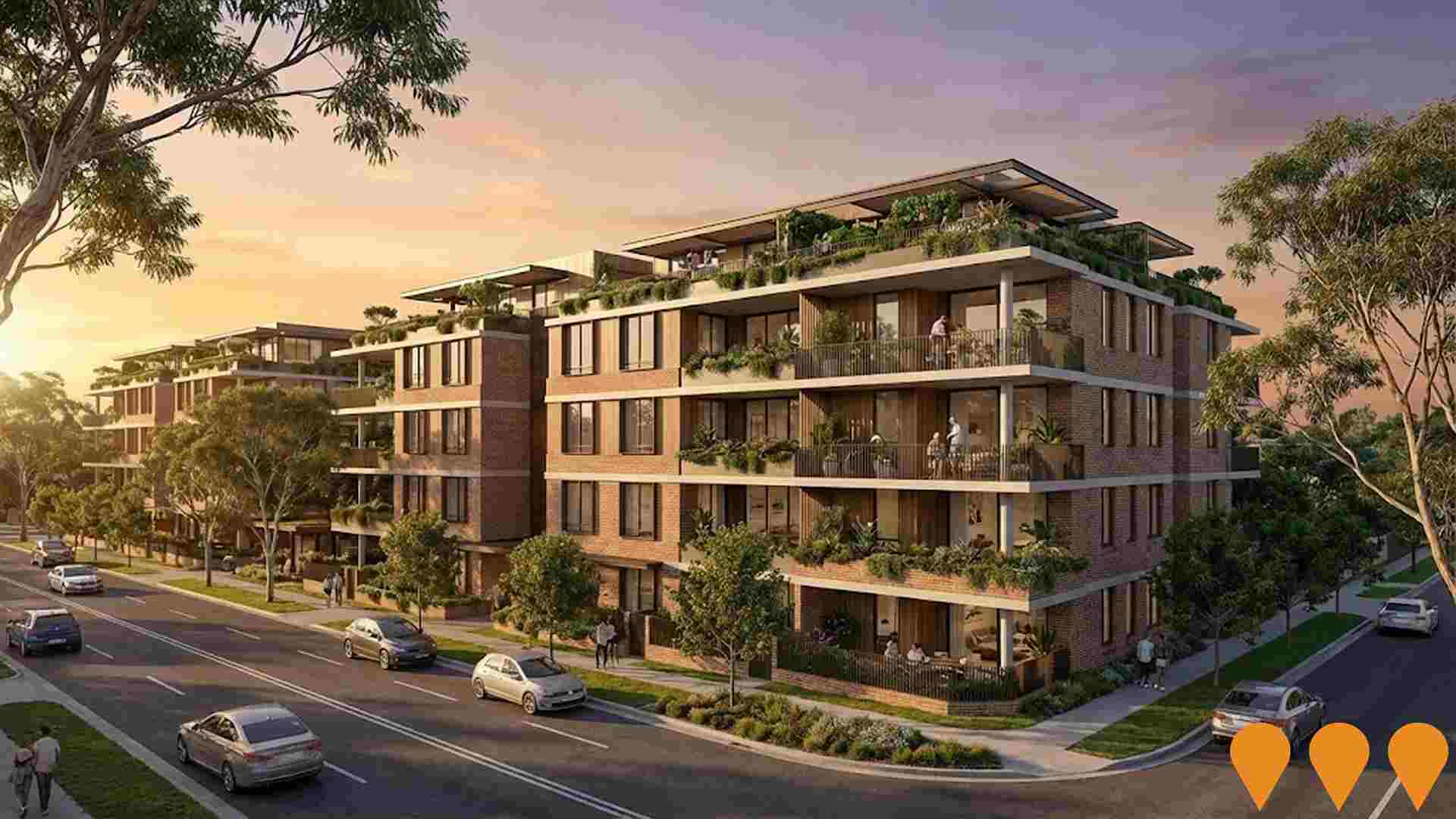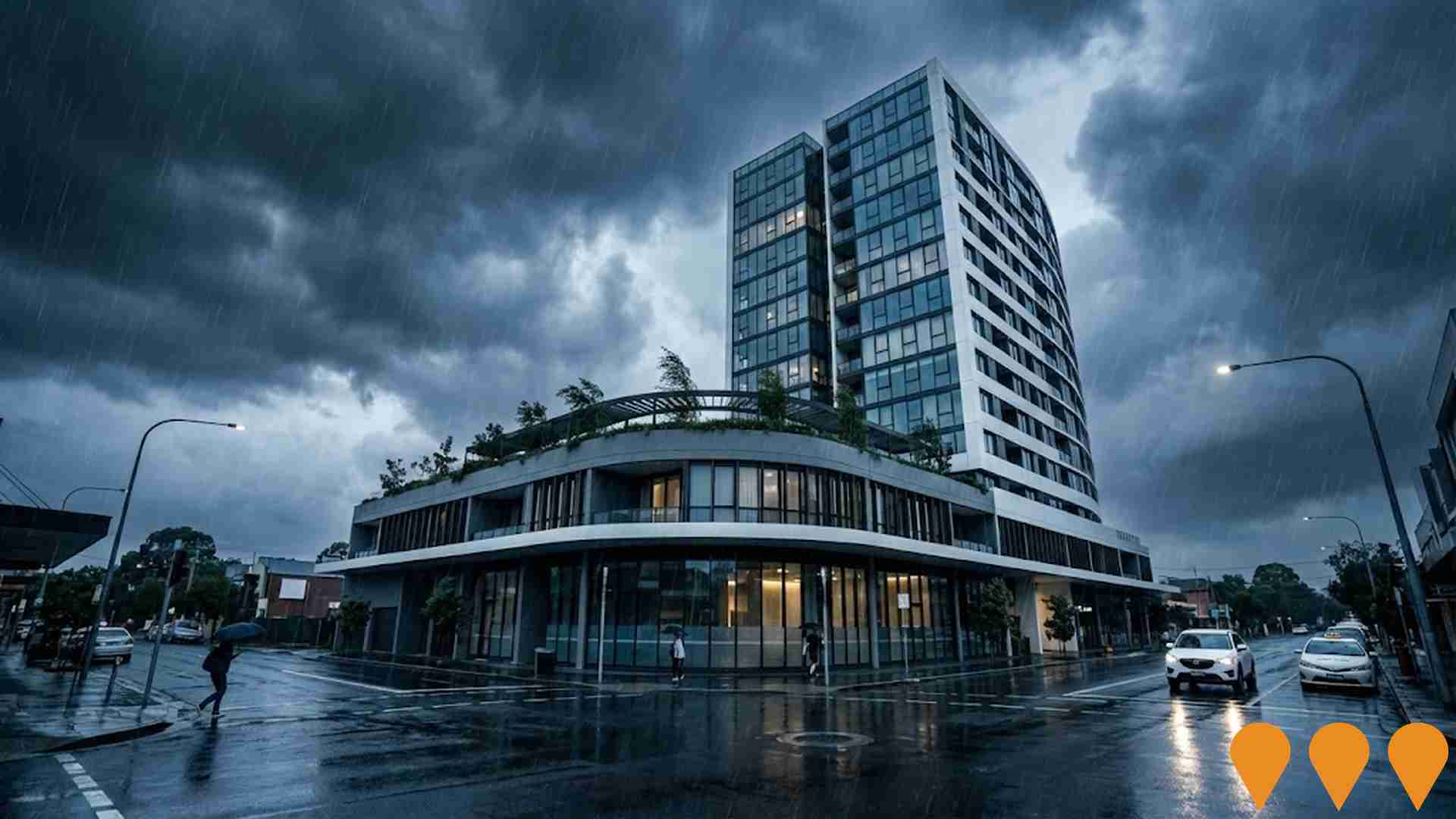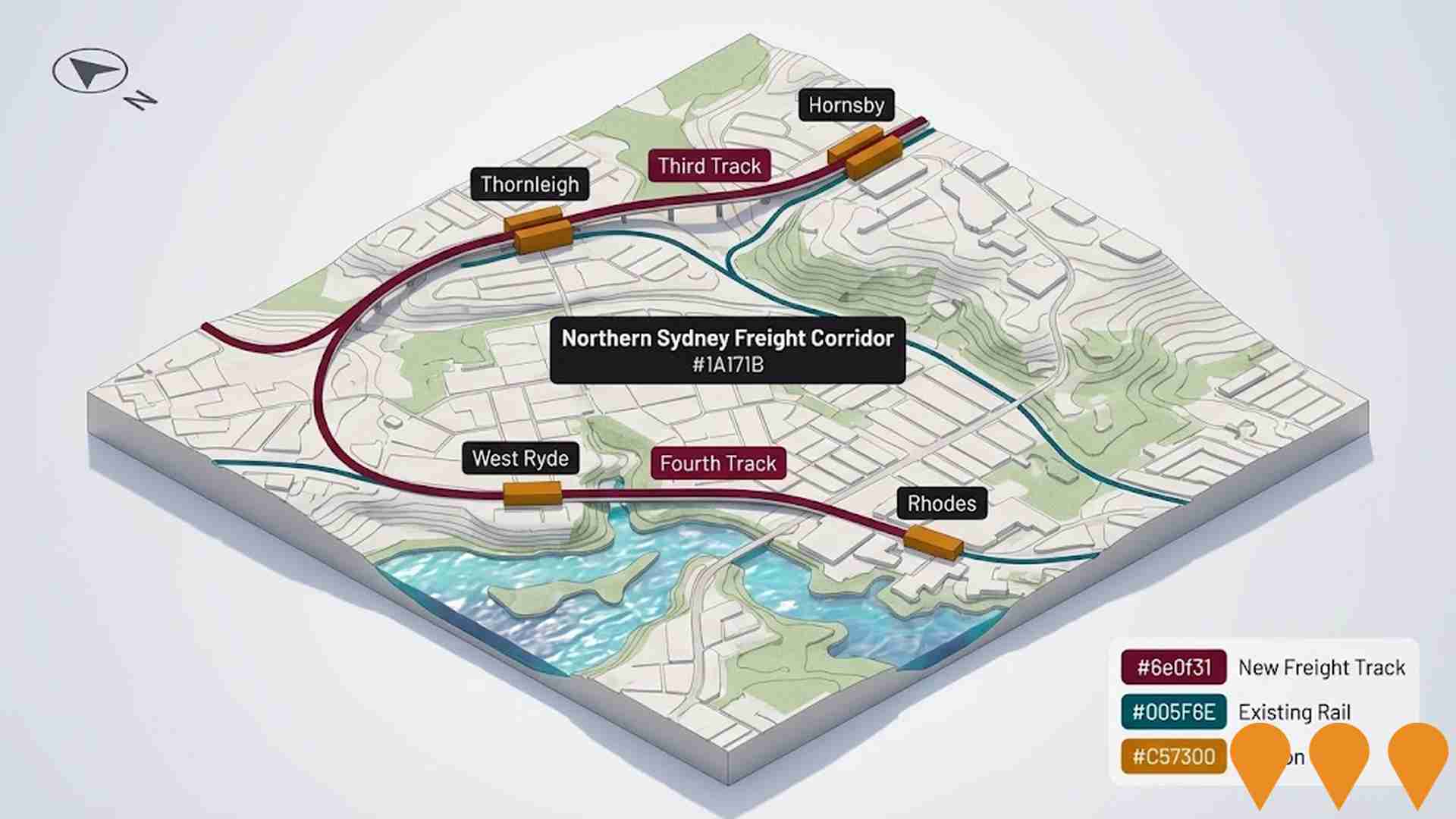Chart Color Schemes
This analysis uses ABS Statistical Areas Level 2 (SA2) boundaries, which can materially differ from Suburbs and Localities (SAL) even when sharing similar names.
SA2 boundaries are defined by the Australian Bureau of Statistics and are designed to represent communities for statistical reporting (e.g., census and ERP).
Suburbs and Localities (SAL) represent commonly-used suburb/locality names (postal-style areas) and may use different geographic boundaries. For comprehensive analysis, consider reviewing both boundary types if available.
est. as @ -- *
ABS ERP | -- people | --
2021 Census | -- people
Sales Activity
Curious about local property values? Filter the chart to assess the volume and appreciation (including resales) trends and regional comparisons, or scroll to the map below view this information at an individual property level.
Find a Recent Sale
Sales Detail
Population
Epping (East) - North Epping lies within the top quartile of areas nationally for population growth performance according to AreaSearch analysis of recent, and medium to long-term trends
Epping (East) - North Epping's population is approximately 15,820 as of November 2025. This figure represents an increase of 1,416 people since the 2021 Census, which recorded a population of 14,404. The growth is inferred from the estimated resident population of 15,616 in June 2024 and an additional 649 validated new addresses since the Census date. This results in a population density ratio of 3,603 persons per square kilometer, placing it in the upper quartile relative to national locations assessed by AreaSearch. The area's growth rate of 9.8% since the 2021 census exceeds that of both its SA3 area (5.7%) and the state, indicating it as a growth leader in the region. Overseas migration contributed approximately 87.8% of overall population gains during recent periods.
AreaSearch adopts ABS/Geoscience Australia projections for each SA2 area, released in 2024 with 2022 as the base year. For areas not covered by this data, AreaSearch utilises NSW State Government's SA2 level projections, released in 2022 with 2021 as the base year. Growth rates by age group from these aggregations are applied to all areas for years 2032 to 2041. Future population dynamics anticipate a significant increase in the top quartile of Australian statistical areas. By 2041, Epping (East) - North Epping is forecasted to grow by 4,988 persons based on the latest annual ERP population numbers, reflecting an overall increase of 30.2% over the 17-year period.
Frequently Asked Questions - Population
Development
The level of residential development activity in Epping (East) - North Epping was found to be higher than 90% of real estate markets across the country
Epping East - North Epping has seen approximately 166 residential properties approved annually. Over the past five financial years, from FY21 to FY25, around 833 homes were granted approval, with another six approved so far in FY26. On average, each dwelling adds about 2.3 new residents per year over these five years.
This demand supports property values, with new homes valued at an average of $403,000. In FY26 alone, there have been $280,000 in commercial development approvals, indicating the area's residential nature. Compared to Greater Sydney, Epping East - North Epping has 60% more development activity per person, offering buyers greater choice and reflecting strong developer confidence. Recent construction comprises 16% detached dwellings and 84% medium to high-density housing, marking a shift from the current 48% houses, suggesting diminishing developable land availability and evolving lifestyle preferences. There are approximately 103 people per dwelling approval in the area. By 2041, population forecasts estimate an increase of 4,784 residents. Existing development levels align with future requirements, maintaining stable market conditions without significant price pressures.
Population forecasts indicate Epping (East) - North Epping will gain 4,784 residents through to 2041 (from the latest AreaSearch quarterly estimate). Existing development levels seem aligned with future requirements, maintaining stable market conditions without significant price pressures.
Frequently Asked Questions - Development
Infrastructure
Epping (East) - North Epping has very high levels of nearby infrastructure activity, ranking in the top 20% nationally
Changes to local infrastructure significantly influence an area's performance. AreaSearch has identified 25 projects likely impacting the area. Notable projects include Cielo Epping, Senso Epping, Epping Town Centre East Upgrades, and Senso Epping Mixed-Use Development. The following list details those most relevant:.
Professional plan users can use the search below to filter and access additional projects.
INFRASTRUCTURE SEARCH
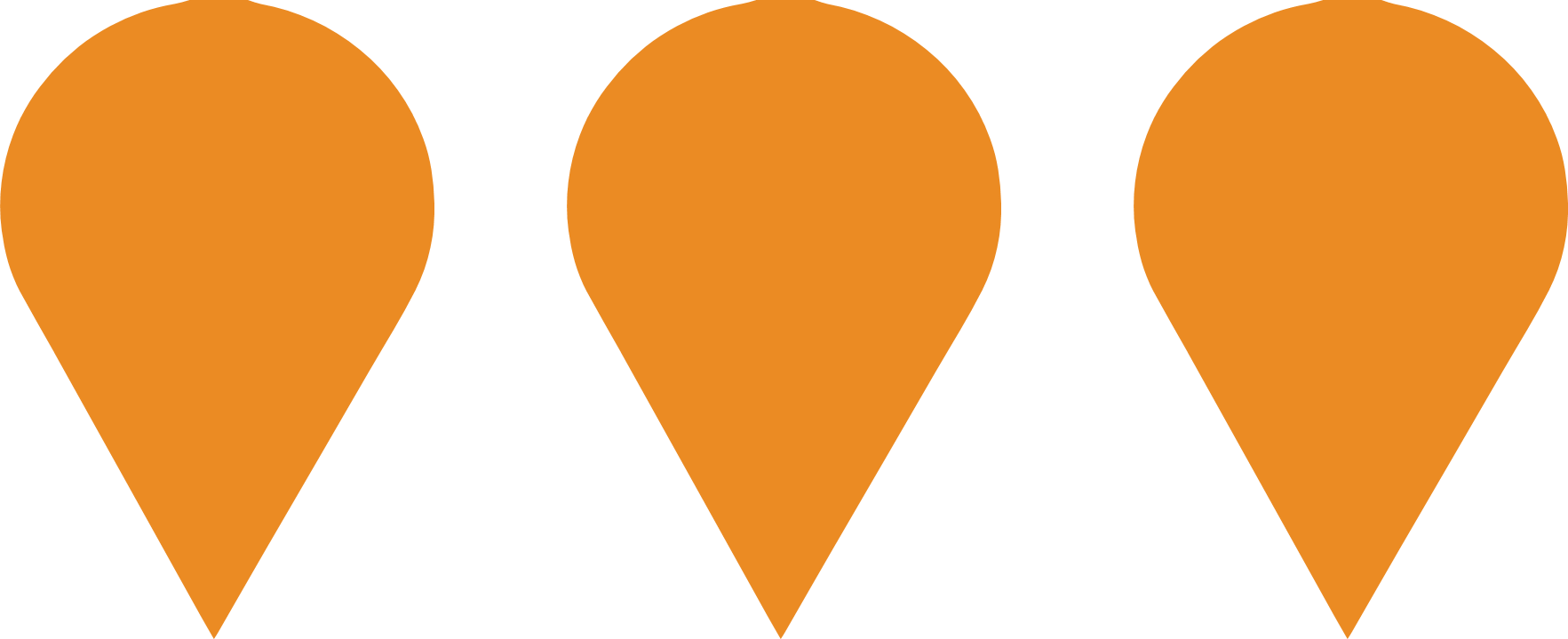 Denotes AI-based impression for illustrative purposes only, not to be taken as definitive under any circumstances. Please follow links and conduct other investigations from the project's source for actual imagery. Developers and project owners wishing us to use original imagery please Contact Us and we will do so.
Denotes AI-based impression for illustrative purposes only, not to be taken as definitive under any circumstances. Please follow links and conduct other investigations from the project's source for actual imagery. Developers and project owners wishing us to use original imagery please Contact Us and we will do so.
Frequently Asked Questions - Infrastructure
The Cambridge Retirement Village
NSW's tallest retirement village - a 28-storey intergenerational vertical community featuring 158-172 independent living units, 132-bed aged care facility (Epping Grand Care Community) operated by Opal HealthCare, rebuilt K-6 Catholic primary school (Our Lady Help of Christians), new parish hall, heritage-listed church preservation, clubhouse with bar, heated indoor pool, state-of-the-art fitness centre, rooftop entertainment spaces with city skyline views, cinema, library, salon, vegetable gardens, retail facilities, and basement parking. Developed by Levande in partnership with the Catholic Diocese of Broken Bay. First residents expected to move in late 2025. The project underwent topping-out ceremony in April 2025 with construction by Richard Crookes Constructions valued at $176 million.

53-61 Rawson Street Mixed-Use Development
Mixed-use redevelopment comprising two towers (36 and 33 storeys) with a full-line supermarket, 3,147 sqm of specialty retail, 7,430 sqm of commercial office space and 420 residential apartments in the heart of Epping Town Centre.
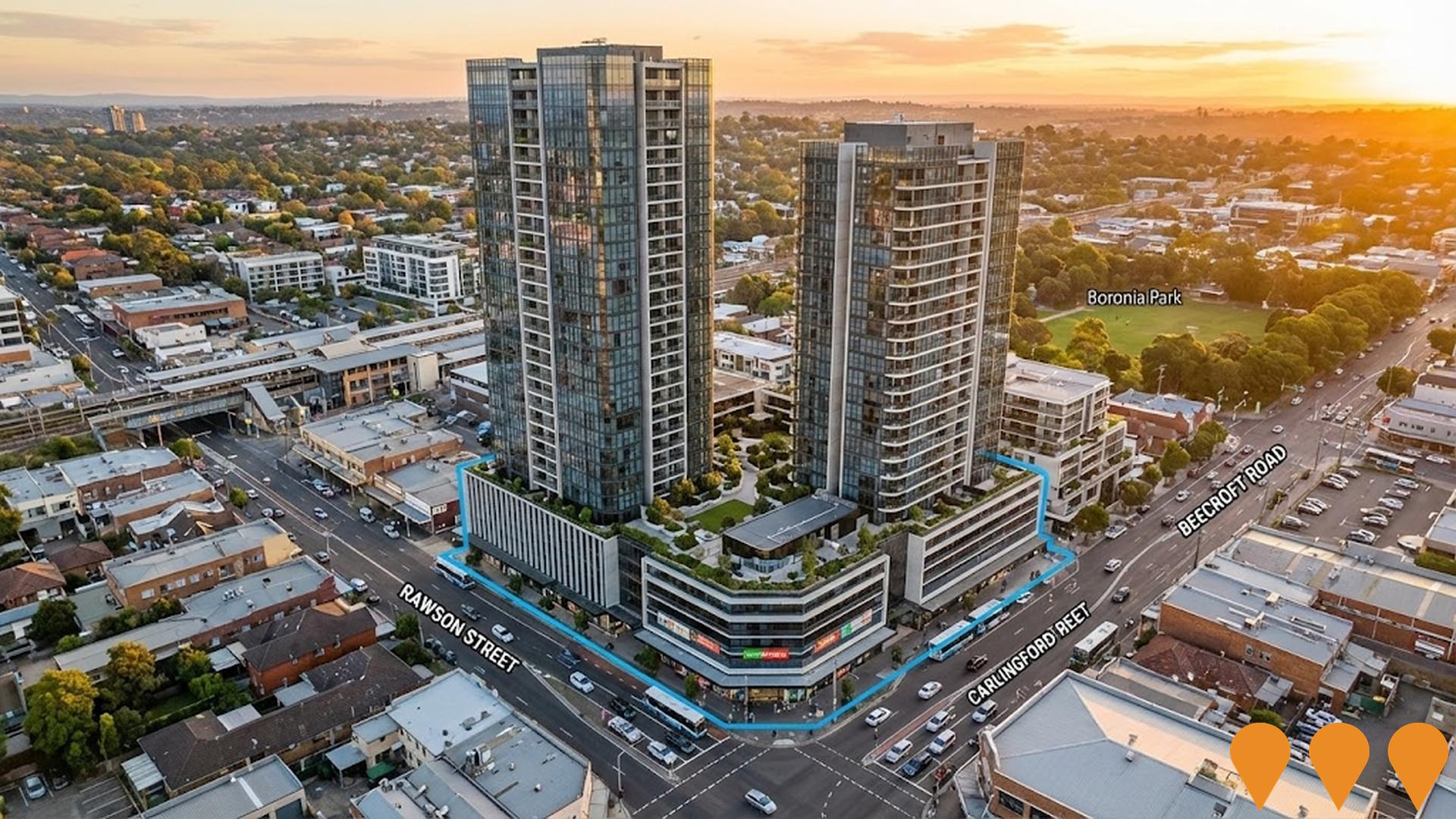
Epping Bridge Project
Replacement of the existing 5-lane Epping Bridge with a new 7-lane bridge across the railway line. The $220 million project jointly funded by Australian and NSW governments includes road improvements to Beecroft Road, Blaxland Road, and Epping Road approaches, enhanced pedestrian/cyclist facilities with shared walking and cycling path, traffic signal upgrades, and new safety screens to reduce congestion and improve safety for over 63,000 daily users. Construction expected to commence mid-2025 and take approximately 5 years to complete.
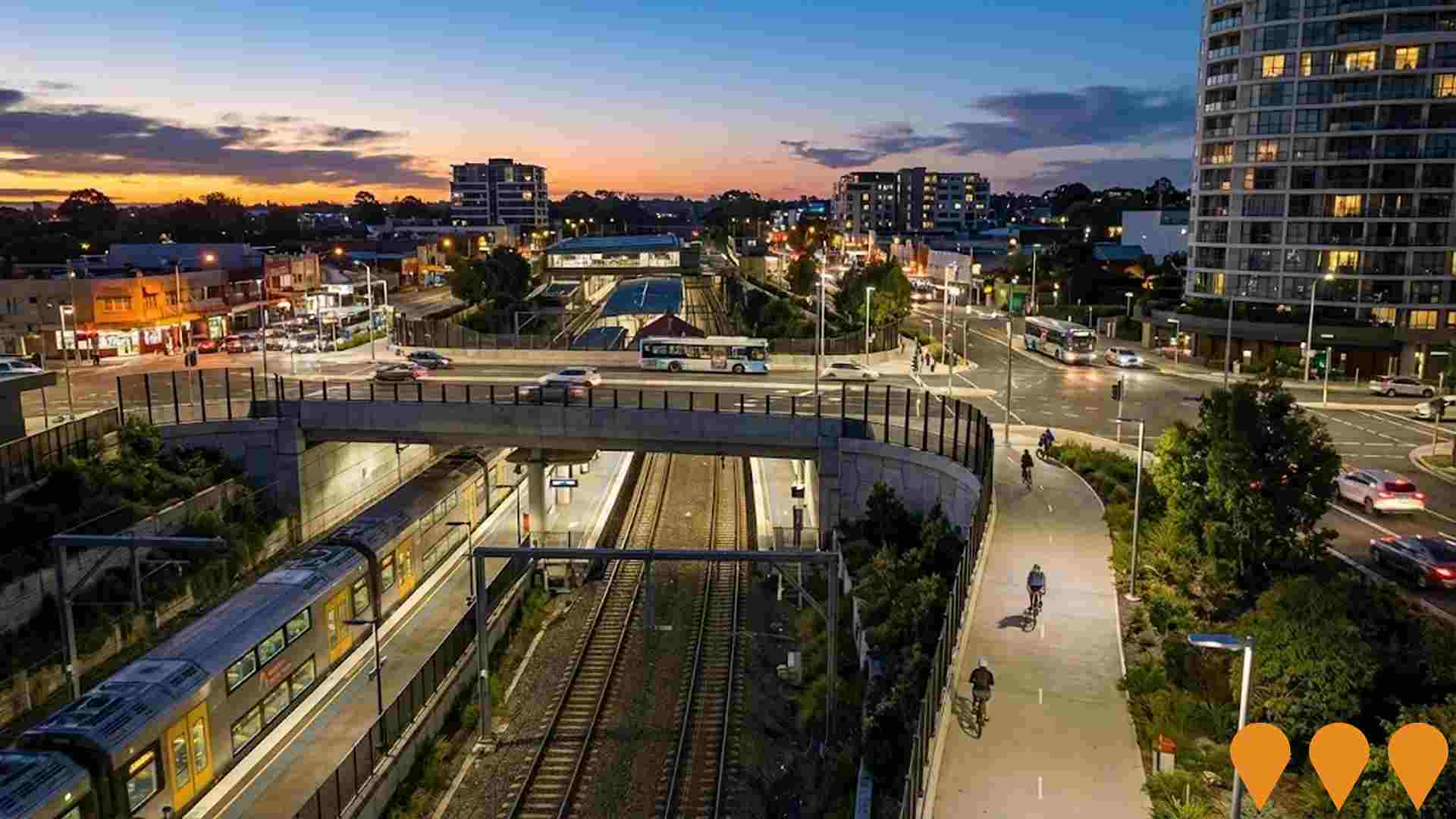
Epping Town Centre Master Plan
Long-term vision to guide the revitalisation of Epping Town Centre west of the railway line, creating a more walkable, connected, and community-focused area with a new town square, upgraded public spaces, safer pedestrian and cycling links, new community facilities, and enhanced laneways and streets.
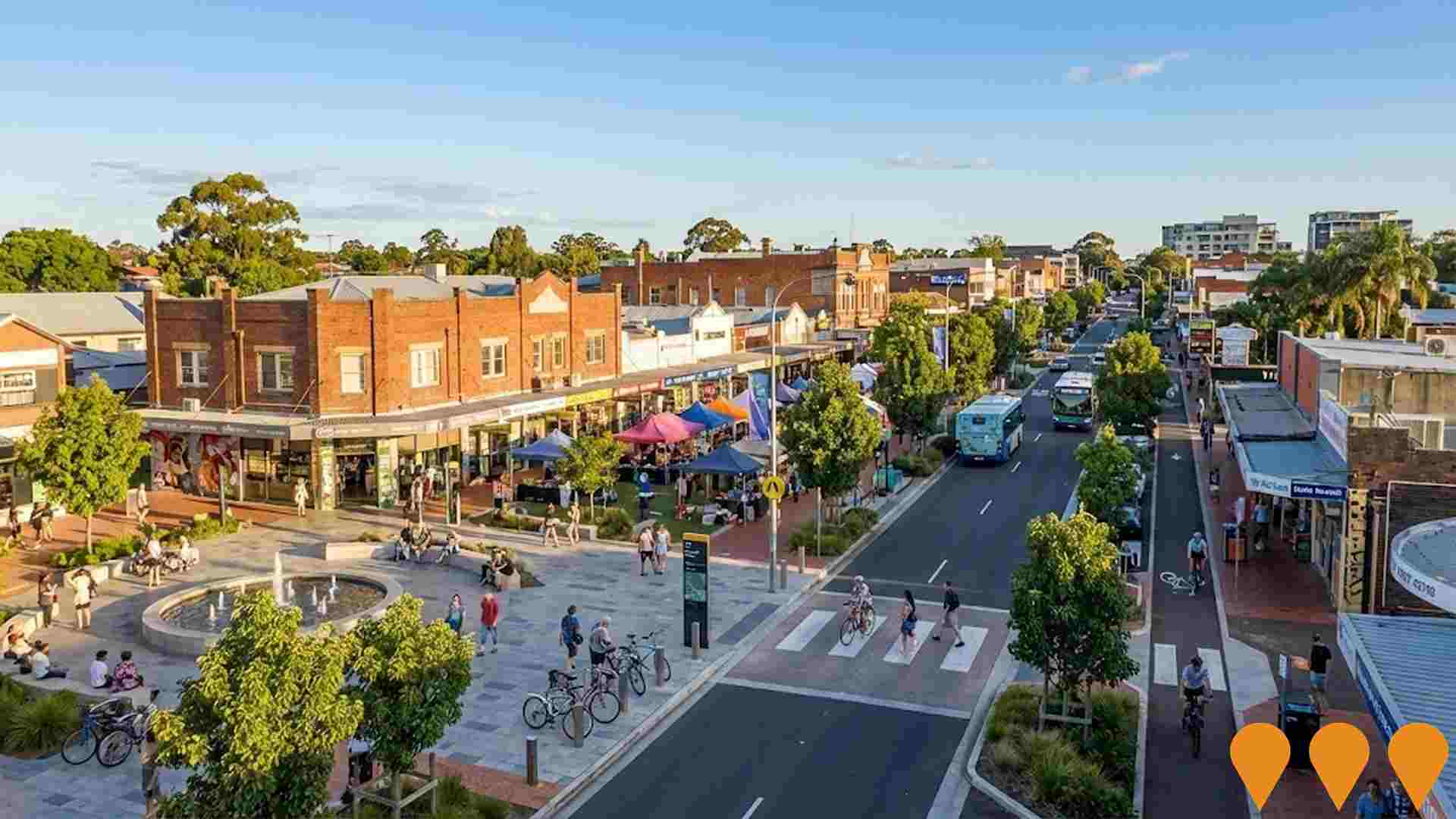
Epping Town Centre East Upgrades
Public domain improvements in Oxford Street, Langston Place, Pembroke Street and Cambridge Street. New paving in selected areas, new kerb ramps and on-grade road pavement treatment for visual direction at pedestrian crossings, new trees and soft landscaping, laneway upgrade adjacent to the Epping School of Arts Community Centre to improve connectivity to Cambridge Street, new street furniture, new decorative and feature lighting, asphalt road pavement upgrade, selective kerb replacement.
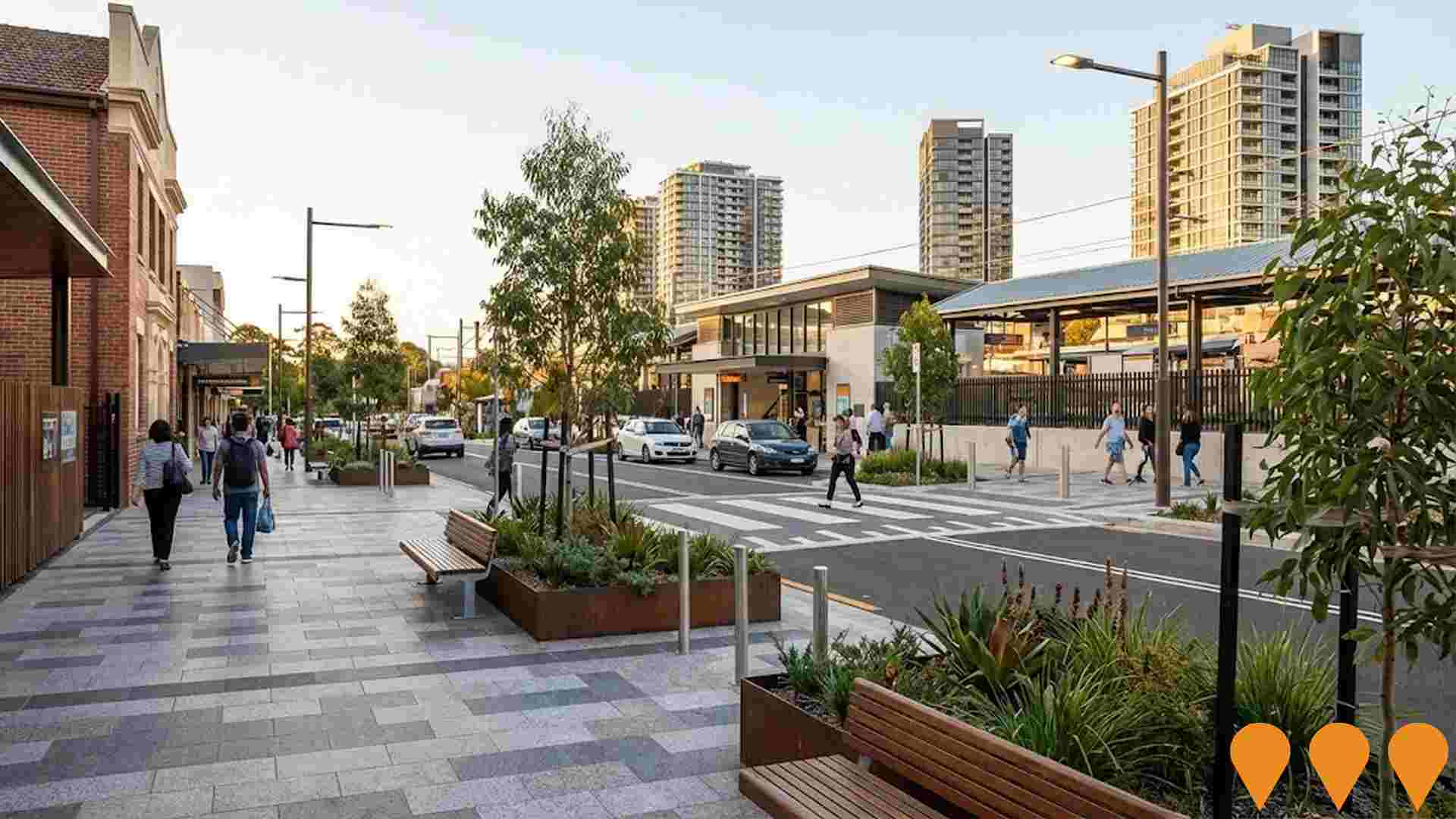
Epping Central Development
Proposed mixed-use development featuring two towers (20 and 22 storeys) with 126 apartments, retail, and commercial spaces opposite Epping train station. The original development application was refused, but demolition approval was granted in 2024, indicating potential revised plans in progress.
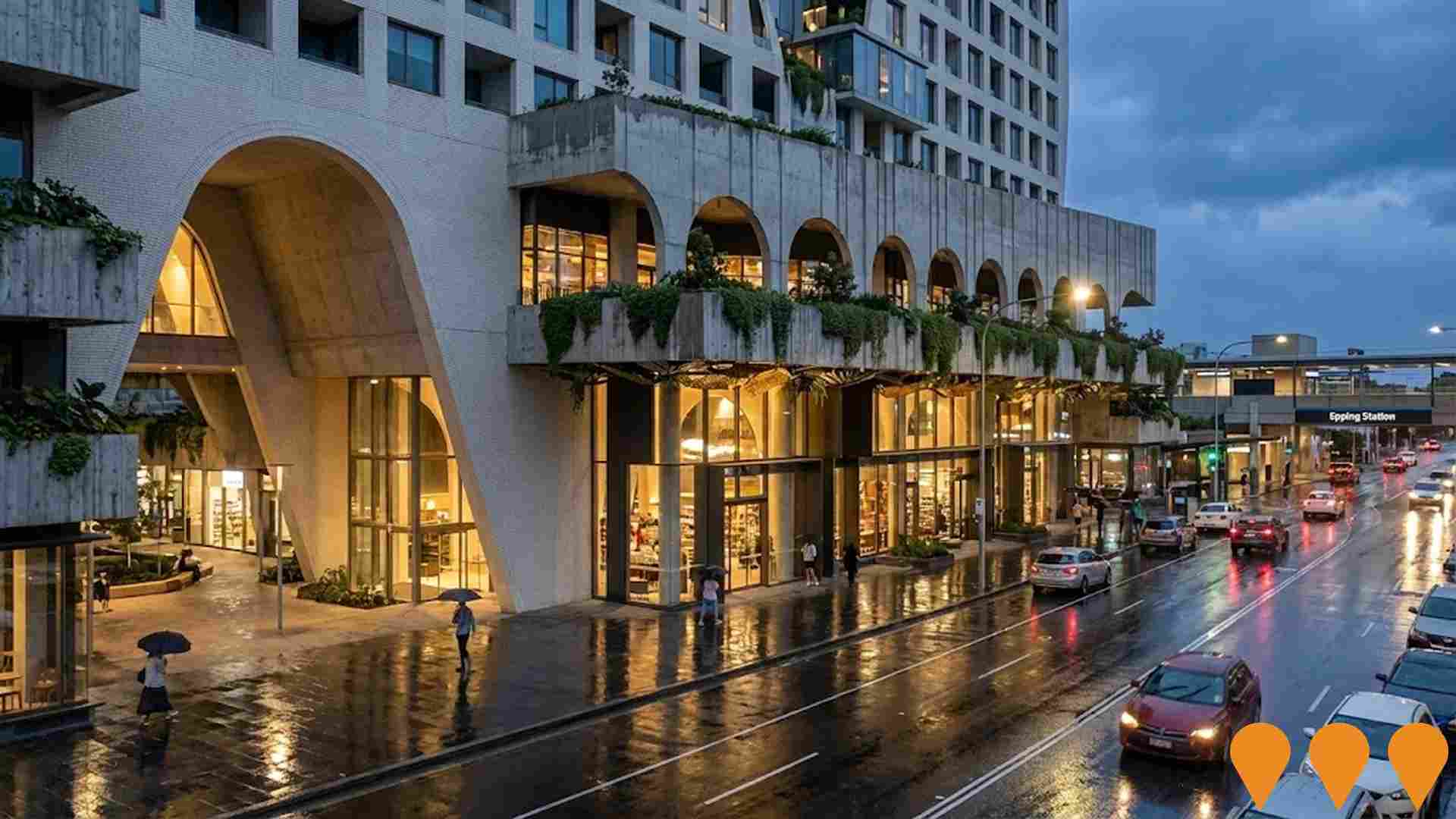
Cielo Epping
Mixed-use development by Meriton featuring Epping's tallest tower at 29 levels with 215 one, two, and three-bedroom apartments. Includes premium finishes, sustainable features, onsite childcare centre, retail shops, cafe, restaurants, gym, sauna, outdoor pool, and landscaped gardens. Convenient access to public transport.
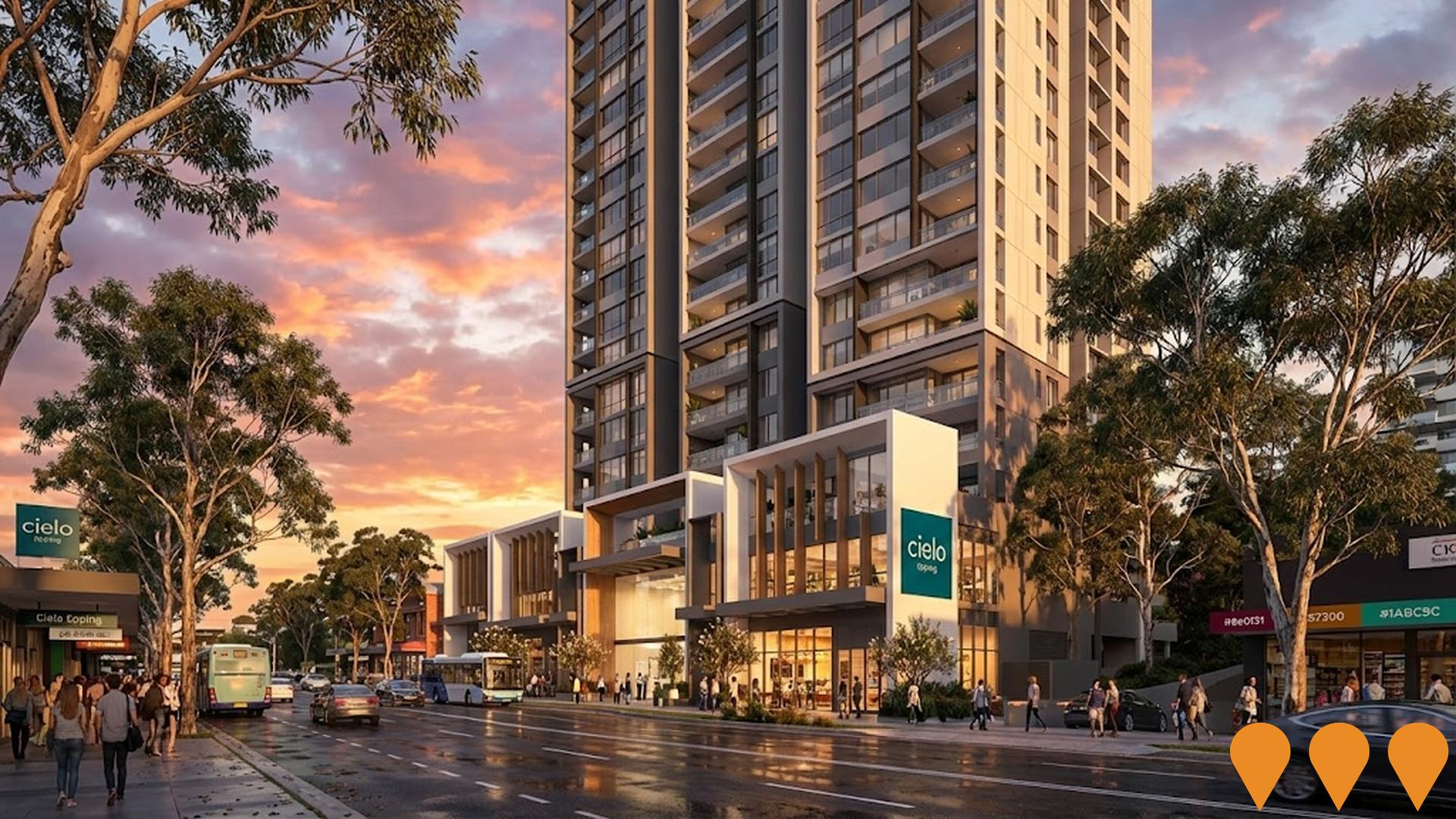
Senso Epping Mixed-Use Development
Mixed-use development at 242-244 Beecroft Road, Epping, featuring up to 479 apartments including studios, 1-4 bedroom units and penthouses, with 918 sqm of retail/commercial space and 5% affordable housing. Includes resort-style amenities such as rooftop pools, cinema, gym, and wellness club. Part of Sydney Metro Northwest Places program, located near Epping Station with an estimated $143 million investment.
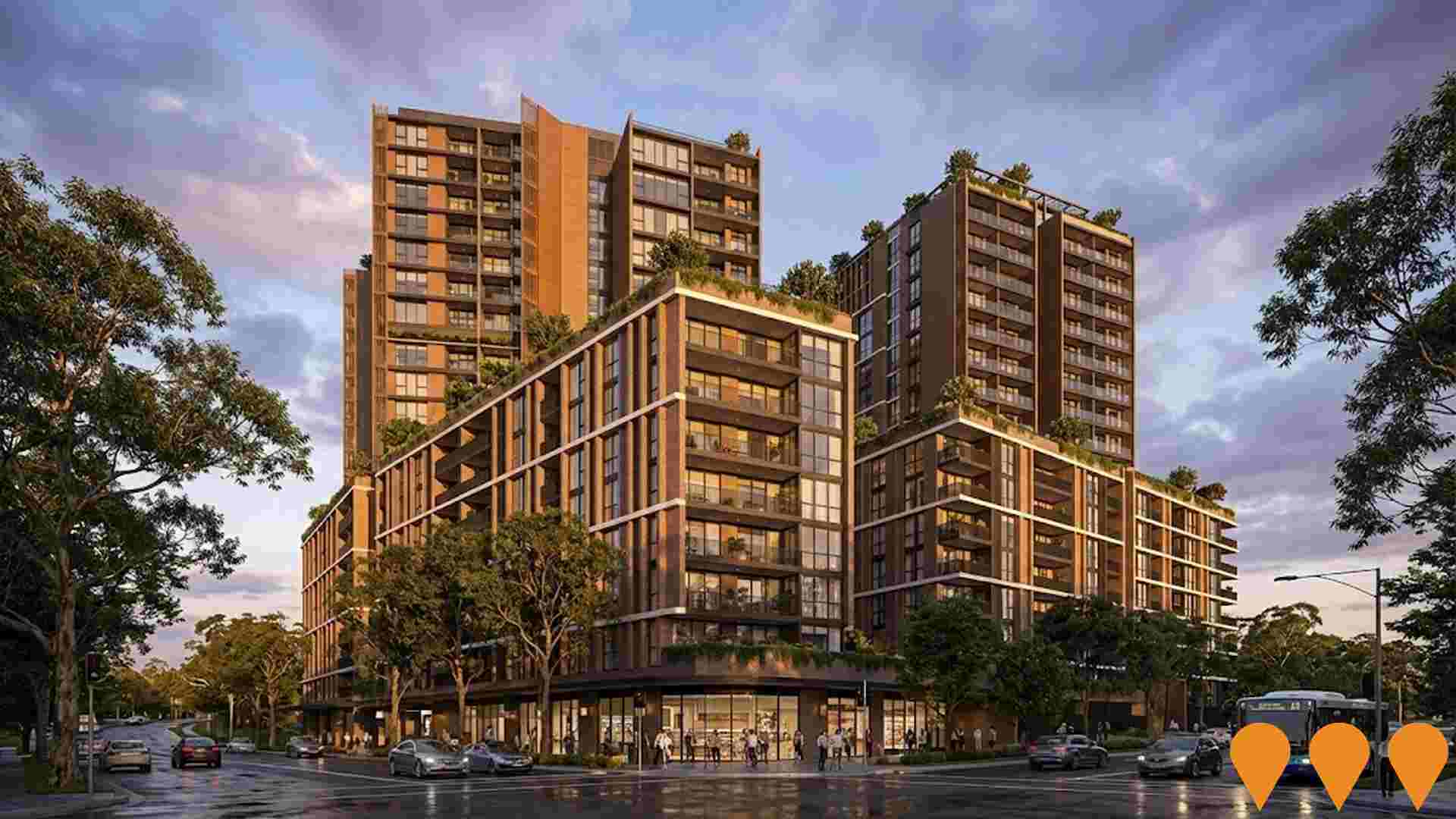
Employment
AreaSearch analysis of employment trends sees Epping (East) - North Epping performing better than 90% of local markets assessed across Australia
Epping (East) - North Epping has a highly educated workforce with notable representation in the technology sector. The unemployment rate was 1.8% as of September 2025, which is lower than Greater Sydney's rate of 4.2%.
Employment growth over the past year was estimated at 10.4%. There are 9,848 residents currently employed, with workforce participation at 65.3%, higher than Greater Sydney's 60.0%. Key industries include professional & technical, health care & social assistance, and finance & insurance. Professional & technical employment is particularly concentrated, at 1.6 times the regional average, while construction shows lower representation at 4.5% compared to the regional average of 8.6%.
Limited local employment opportunities are indicated by the count of Census working population versus resident population. Over a 12-month period, employment increased by 10.4%, labour force by 9.6%, leading to a unemployment rate decrease of 0.7 percentage points. In contrast, Greater Sydney saw employment grow by 2.1% and unemployment rise by 0.2 percentage points. State-level data from 25-Nov shows NSW employment contracted by 0.03%, with an unemployment rate of 3.9%. National unemployment was at 4.3%. Jobs and Skills Australia's national employment forecasts, published in May-25, project a 6.6% increase over five years and 13.7% over ten years. Applying these projections to Epping (East) - North Epping's employment mix suggests local employment should increase by 7.5% over five years and 14.9% over ten years.
Frequently Asked Questions - Employment
Income
Income metrics indicate excellent economic conditions, with the area achieving higher performance than 75% of national locations assessed by AreaSearch
According to AreaSearch's aggregation of ATO data released on June 30, 2022, Epping (East) - North Epping SA2 had a median taxpayer income of $54,708 and an average income of $77,286. Nationally, these figures are high compared to the national median of $56,994 and national average of $80,856. By September 2025, estimated incomes would be approximately $61,607 (median) and $87,032 (average), based on a 12.61% Wage Price Index growth since June 2022. The 2021 Census places household, family, and personal incomes in Epping (East) - North Epping between the 80th and 87th percentiles nationally. Income analysis shows that 30.3% of residents (4,793 people) earn between $1,500 and $2,999 weekly, reflecting regional patterns where 30.9% fall into this bracket. High earners make up a substantial presence with 39.8% earning over $3,000 weekly. Housing costs consume 15.9% of income, but strong earnings place disposable income at the 86th percentile nationally. The area's SEIFA income ranking places it in the 9th decile.
Frequently Asked Questions - Income
Housing
Epping (East) - North Epping features a more urban dwelling mix with significant apartment living, with a higher proportion of rental properties than the broader region
In Epping (East) - North Epping, as per the latest Census evaluation, houses constituted 47.9% of dwellings, while other types such as semi-detached, apartments, and 'other' dwellings made up 52.1%. This differs from Sydney metro's dwelling composition of 60.5% houses and 39.5% other dwellings. Home ownership in Epping (East) - North Epping stood at 30.4%, with mortgaged dwellings at 31.6% and rented ones at 38.0%. The median monthly mortgage repayment in the area was $2,605, lower than Sydney metro's average of $2,817. The median weekly rent figure in Epping (East) - North Epping was $500, matching Sydney metro's figure but significantly higher than the national average of $375. Nationally, mortgage repayments in Epping (East) - North Epping were notably higher than the Australian average of $1,863.
Frequently Asked Questions - Housing
Household Composition
Epping (East) - North Epping features high concentrations of family households and group households, with a fairly typical median household size
Family households account for 77.7% of all households, consisting of 43.1% couples with children, 24.8% couples without children, and 8.8% single parent families. Non-family households constitute the remaining 22.3%, with lone person households at 18.2% and group households comprising 4.0%. The median household size is 2.8 people, which aligns with the Greater Sydney average.
Frequently Asked Questions - Households
Local Schools & Education
Epping (East) - North Epping demonstrates exceptional educational outcomes, ranking among the top 5% of areas nationally based on AreaSearch's comprehensive analysis of qualification and performance metrics
Epping (East) has a notable educational advantage with 60.2% of residents aged 15+ holding university qualifications compared to Australia's 30.4% and NSW's 32.2%. Bachelor degrees are the most common at 35.1%, followed by postgraduate qualifications at 21.7% and graduate diplomas at 3.4%. Vocational pathways account for 17.0% of qualifications, with advanced diplomas at 9.0% and certificates at 8.0%. Educational participation is high, with 32.5% of residents currently enrolled in formal education.
This includes 10.1% in primary education, 8.3% in tertiary education, and 7.9% pursuing secondary education.
Frequently Asked Questions - Education
Schools Detail
Nearby Services & Amenities
Transport
Transport servicing is high compared to other areas nationally based on assessment of service frequency, route connectivity and accessibility
Public transport analysis shows 65 active transport stops operating within Epping (East) - North Epping. These include a mix of train, light rail, and bus services. They are serviced by 14 individual routes, collectively providing 6,506 weekly passenger trips.
Transport accessibility is rated as excellent, with residents typically located 131 meters from the nearest transport stop. Service frequency averages 929 trips per day across all routes, equating to approximately 100 weekly trips per individual stop.
Frequently Asked Questions - Transport
Transport Stops Detail
Health
Epping (East) - North Epping's residents boast exceedingly positive health performance metrics with very low prevalence of common health conditions across all age groups
Epping (East) - North Epping shows excellent health outcomes, with very low prevalence of common health conditions across all age groups. Private health cover is high at approximately 58% of the total population (~9,143 people), compared to Greater Sydney's 62.5%.
The most prevalent medical conditions are asthma and mental health issues, affecting 5.1 and 4.6% of residents respectively. 80.2% of residents report being completely clear of medical ailments, compared to 78.1% across Greater Sydney. The area has 15.0% of residents aged 65 and over (2,365 people), lower than Greater Sydney's 17.2%. Health outcomes among seniors are strong, mirroring the general population's health profile.
Frequently Asked Questions - Health
Cultural Diversity
Epping (East) - North Epping is among the most culturally diverse areas in the country based on AreaSearch assessment of a range of language and cultural background related metrics
Epping East-North Epping is among the most culturally diverse areas in Australia, with 57.5% of its population speaking a language other than English at home according to data from June 2016. In terms of birthplace, 56.2% of residents were born overseas. Christianity was found to be the main religion, comprising 40.4% of people in Epping East-North Epping during this period.
Hinduism showed notable overrepresentation at 10.4%, compared to 7.9% across Greater Sydney. The top three ancestry groups based on country of birth of parents were Chinese (27.1%), English (14.3%), and Australian (13.0%). Other ethnic groups with significant representation included Korean (6.3%) and Indian (8.8%), both notably higher than their regional percentages of 5.4% and 6.4%, respectively. Sri Lankan ancestry was present at 0.6%.
Frequently Asked Questions - Diversity
Age
Epping (East) - North Epping's population is slightly younger than the national pattern
Epping (East) - North Epping's median age is nearly 36 years, close to Greater Sydney's average of 37 and slightly below Australia's median of 38. Compared to Greater Sydney, Epping (East) - North Epping has a higher proportion of residents aged 15-24 (14.2%) but fewer residents aged 0-4 (4.0%). Between the 2021 Census and the present day, the percentage of residents aged 15 to 24 has grown from 11.8% to 14.2%. Conversely, the proportion of residents aged 25 to 34 has decreased from 15.9% to 14.8%, and the percentage of residents aged 0 to 4 has dropped from 5.0% to 4.0%. By 2041, demographic modeling projects significant changes in Epping (East) - North Epping's age profile. The 15-24 cohort is projected to grow by 44%, adding 999 residents to reach a total of 3,246. Meanwhile, the 0-4 cohort is projected to grow by 6%, an increase of 40 people.
